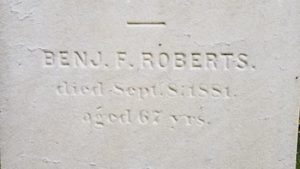
Benjamin F. Roberts (gravestone)
*Benjamin F. Roberts was born on this date in 1815. He was a Black printer, writer, activist, and abolitionist.
Benjamin F. Roberts was one of the 12 children of Sarah and Robert Roberts. Born in Boston, Massachusetts, he was named after Benjamin Franklin and came from an impressive lineage of activists and writers through both his mother's and father's sides. His father was a servant and then a stevedore and wrote The House Servant's Directory in 1827, one of the first books written by a black person to be published. His grandfather, James Easton, who was on his mother's side, protested segregation with demonstrations at church as early as 1800.
Roberts attended the Good Samaritan School in North Bridgewater and began working as a shoemaker's apprentice. Occasionally, he wrote editorials for the Liberator. Much of his writing argued for recognizing blacks as Americans, specifically in reaction to organizations such as the American Colonization Society that supported the deportation of African Americans. He felt integration and equal education would help combat the belief that blacks did not belong in America. Roberts married Adeline Fowler in 1838. In April of that year, he established an abolitionist publication called Anti-Slavery Herald that would better represent black writers and their views. Subscription fees helped the paper provide apprenticeships for blacks to learn the printing trade. No issues of the Anti-Slavery Herald survive.
After the paper's close, the Roberts family moved, and he continued his printing business. He printed the town's first directory in 1841 and other pamphlets, broadsides, and books. Of note is an expanded, one-volume edition of the African and Native American author Robert Benjamin Lewis's book Light and Truth. Robert's legacy is his 1848 lawsuit, Sarah Roberts v. Boston, on behalf of his five-year-old daughter. Sarah, who was enrolled in the segregated Abiel Smith School, attempted to attend a white school that was a shorter and safer walk from her home and gave a better quality education.
The quality of the Smith school was poor, and a school boycott was underway. This was a re-emergence of Roberts's activism after losing his first paper. Lawyer Robert Morris filed the case. When the case reached the Superior Court, Charles Sumner was brought on as co-counsel. Chief Justice Lemuel Shaw of the Massachusetts Supreme Judicial Court ruled against them and upheld racial segregation in schools. In 1896, the case became the foundation for the "separate but equal" standard that resulted from Plessy v. Ferguson.
In 1853, Roberts again tried publishing a paper but was unsuccessful. Benjamin Roberts died on September 6, 1881, at age 66 from epilepsy. He is buried in Middlesex County's Mount Auburn Cemetery, sharing a headstone with his father-in-law, William Fowler.